By Alan Caruba
I know you’re thinking the title refers to Al Gore, but no, it belongs to Paul Krugman, an economist best known as a New York Times columnist, and winner in 2008 of the Nobel Memorial Prize in Economic Science. He is widely regarded as an expert in international economics and has very impressive curriculum vitae. By all the standards of our times, the man is a genius.
Anyone who has worked for an institution of higher learning as I once did soon loses his awe of PhDs. Their expertise is usually very narrow. The intellectual hot house which they share also includes immense pressure to demonstrate through research and publication that they are productive. There is a herd mentality and some vicious politics that goes on as well.
Krugman may know about economics, otherwise known as the “dismal science” because I suspect the capacity to be very wrong is equal to or greater than the chance of getting things right. Most certainly, his May 15 column, based on a trip to China demonstrated he knows nothing about meteorology, climatology, the science of the Earth’s atmosphere.
The Nobel Prize winner demonstrated what a moron he is when he strayed into the usual discredited blather associated with “global warming.” He spouts the nonsense about greenhouse gas emissions like some Red Guard reading from Chairman Mao’s Little Red Book. “The scientific consensus on prospect for global warming,” wrote Klugman, “has become much more pessimistic over the last few years.” Firstly, the Greens have been predicting global warming since the 1980s, always concluding it was due to arrive ten, fifteen, twenty or fifty years from now. This is usually a good indicator of how flawed and false such predictions actually are.
Second, there is no such thing as a scientific “consensus” about global warming, unless you include the growing consensus that it is a huge scam designed to further a hidden agenda to destroy the economies of industrialized nations. In March I attended the 2nd annual Climate Change Conference sponsored by The Heartland Institute. It was wall-to-wall seminars by climatologists and others demonstrating why carbon dioxide in particular plays no role whatever in determining the Earth’s climate trends and never did.
But for Klugman, like Al Gore, facts are of no value when writing about global warming. “Indeed, the latest projects from reputable climate scientists border on the apocalyptic. Why? Because the rate at which greenhouse gas emissions are rising is matching or exceeding the worst-case scenarios.”
Wrong, wrong, and wrong. Since carbon dioxide, a gas as vital as oxygen to all life on earth, plays no role in climate change, this assertion is just a regurgitation of Al Gore’s boldfaced lies. As to worst-case scenarios, that is the stock-in-trade of the Greens who conjured up the global warming hoax. It is based entirely on flawed and deceptive computer models.
The Earth has been cooling for the past ten years and, given the low activity of the Sun, the primary determinant of the Earth’s climate and temperature, solar scientists and others are predicting we could be on the cusp of a new little ice age or worse---a full-scale ice age that will render civilization’s short rise moot as nations find themselves buried under miles of ice for the next 100,000 years until the next interglacial period. It is, quite simply, colder everywhere.
Krugman’s main criticism of China, where he had visited prior to writing his column, was that “In January, China announced that it plans to continue its reliance on coal as its main energy source and that to feed its economic growth it will increase coal production 30 percent by 2015.” Good for China! I wish that the United States would permit, nay encourage, coal-fired plants to provide the electricity we will need by 2015 and beyond. The opposite, however, is happening in the United States which has elected a President who’s on record saying he’d prefer to “bankrupt” any company that dared to build a coal-fired plant. Meanwhile, coal is the source of just over 50 percent of all the electricity we currently use!
If the U.S. continues to refuse to permit more coal-fired plants and continues to delay the building of more nuclear plants, we will not have the energy the economy needs to grow and Americans will begin to experience blackouts and brownouts like the banana republic we shall surely become. Krugman was annoyed that the Chinese, more than a billion of them, seem to believe they have as much right to a lifestyle similar to ours, most of which was built on the availability of cheap energy and remains dependent on its affordability. If Congress passes the insane “cap and trade” emissions legislation, it will crash the nation’s economy. And they know it! “The burden should fall,” wrote Krugman, “on those foreign consumers instead, that shoppers who buy Chinese products should pay a ‘carbon tariff’ that reflects the emissions associated with these goods’ production.” So, instead of benefiting from affordable Chinese exports, Americans should pay more for something - global warming -that is not happening and punish China and themselves in the process.
It just gets worse from that point on as Krugman writes that, “Sooner than most people think, countries that refuse to limit their greenhouse gas emissions will face sanctions, probably in the form of taxes on their exports.” Great! That’s just what we need with China, a trade war! if this is the best a Nobel Prize winning economist has to offer then the process of destroying our economy is already under way. Lesser mortals will instantly identify his remedies as idiotic. Read more here.
By James Delingpole, UK Guardian
Hurrah! Intrepid explorer Pen Hadow and his Catlin Arctic Survey team are off the polar ice cap and safe and well. This is a huge relief to those many of us well-wishers concerned that they were doomed to die either by frostbite, attack by one of the numerous killer polar bears that stalk the region, or shame that their expedition had turned out to be such a Scott-tastic flop.
They set out to the high arctic 73 days ago full of high hopes. They were going to tramp all the way to the North Pole. (But were frustrated by the unseasonal cold.) They were going to march 1000 km (they managed 434). Above all, they were going to raise awareness of “climate change” by drilling lots of holes in the polar ice cap so as to show how worryingly thin it is, and in how imminent danger of doom. (But their equipment broke in the freezing temperatures and anyway, as Christopher Booker reported the other day, there are US Army buoys which already do this job perfectly well and have found that since last March the ice has thickened by “at least half a metre").
And now to cap it all (ho ho), comes the still more tragic news that the Arctic isn’t warming up dramatically after all. According to figures from the Danish Meteorological Institute - as posted by Steven Goddard on the inestimable Watts Up With That site - Arctic mean temperatures have barely changed since the start of their records in 1958. The Arctic was in fact warmer in the 1940s than it is now, but cooled between 1940 and 1980.
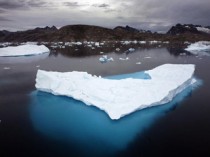
“For the sake of our children and grandchildren, I pray that we will heed the findings of the Catlin arctic survey,” said the Prince of Wales when he launched what he called this “remarkably important project.”
For once HRH and I are in complete agreement. Thanks to this expedition’s selfless heroism, we now know that:
1. The Arctic is extremely parky.
2. Even parkier in fact than we could ever have suspected.
3. We can put our melting ice cap terror on hold for a while.
4. And our fears about melting polar bears.
5. Drinks all round, I say. Creme de Menthe frappe, anyone?
Read full post here.
Read the spin doctors in the media view here and here.
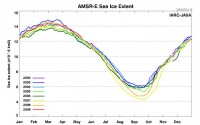
See latest ice extent is highest in the 7 years of record for May 14 shown above and shown larger here. See more on Greenland and the arctic here.
By Shawn D. Lewis, The Detroit News
It was supposed to be a shining example of the green movement—a completely independent solar-powered house with no gas or electrical hookups. Seven months ago, officials gathered for a ribbon-cutting ceremony to celebrate the $900,000 house owned by the city of Troy that was to be used as an educational tool and meeting spot.
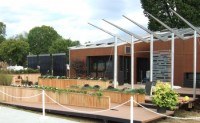
But it never opened to the public. And it remains closed. Frozen pipes during the winter caused $16,000 in damage to floors, and city officials aren’t sure when the house at the Troy Community Center will open. “It’s not safe right now, and there’s no estimated opening time because it depends on when we can get funding,” said Carol Anderson, director of the city’s Parks and Recreation Department.
That surprised the Oakland County Planning and Economic Development Department, which advertised tours of the house for its Tuesday Oakland County Green Summit. “No, I didn’t know anything about it,” said Steve Huber, spokesman for county planning. Bret Rasegnan, planning supervisor for the department, said the solar tours have been removed from the finalized agenda for the summit.
“It is disappointing that we can’t tour, but the summit will still be of great value. I don’t think it’s reflective of the technology.” Lawrence Technological University, with help from DTE, mostly paid for the building. Its students built the 800-square-foot home, which was supposed to be livable year-round, free from the grid and churn out enough solar power to support a home-based business and electric vehicle.
So what caused the flood? The city says it was a mechanical problem. University officials heard it differently. Jeff Biegler, superintendent of parks for the city, said the flooding occurred from a glitch in the heater. “The system was designed to kick a heater on to keep water from freezing,” Biegler said. “The heater drew all reserve power out of the battery causing the system to back down and the pipes froze.”
Joe Veryser, an associate dean of architecture at the university, said he heard otherwise. “What I heard repeatedly was that somebody turned off the breaker during the winter and forgot to turn it back on, which caused the pipes to freeze and then break.” See story here.
As we found many examples with wind power, back-up energy sources are needed for when the wind doesn’t blow or the sun doesn’t shine. Renewables like wind and sun will be useful as supplemental energy sources, but not as the total solution anytime soon. Denmark, the world’s most intensive renewable energy country with 19% of the energy needs met by wind power, has not been able to close a single fossil fuel plant and had to use 50% more electricity and has had its emissions rise 36%. Read more here.
CO2 Science: Free Energy is Not Cheap. In a recent Repower America ad that laments our weaker economy and a worsening climate crisis, we are told we can take advantage of free energy sources like the wind and sun to solve our problems ...
By Marc Morano, Climate Depot
UK Guardian - May 13, 2009
Excerpt: The team of four trekked more than 269 miles for 73 days but were unable to make it to the North Pole because of extreme weather, with temperatures dropping below -40 degrees Celsius. The Catlin Arctic Survey, the first Polar expedition to monitor the affects of climate change on sea ice, was also unable to measure the ice using state-of-the art equipment because of the freezing conditions.

Physicist Dr. Lubos Motl: Warming explorers learned ‘Nature is in charge of the atmosphere’ - May 13, 2009
Excerpt: The three explorers have learned that the Arctic Ocean is pretty cold! They saw all their advanced scientific gadgets freeze and break. They have survived frozen-solid clothes, a frost-bitten and stinky toe, a needle in a buttock, and an anti-septic cream pretending to be a toothpaste. The expedition has showed that the Arctic Ocean is cool enough for the airplanes to safely land in the middle of May, much later than what used to be considered as the limit back in 2003 (April 30th). They learned that there are places without any multi-year ice and the new ice can still be very thick. Most importantly, they have learned that Nature, and not arrogant or other humans, is in charge of the atmosphere. When it comes to millions of squared kilometers of ice, the human civilization is pretty weak and impotent.
North Pole trek mapping Arctic sea ice ends early - AFP - May 13, 2009
Excerpt: The three explorers Pen Hadow, Ann Daniels and Martin Hartley had to undertake survey work manually after the team’s equipment failed to stand up to the hostile Arctic conditions. Bad weather repeatedly prevented supply planes from reaching them, occasionally leaving them with half-rations as they battled brutal elements, while Hartley also got frostbite in his right big toe. There was also “a lot less open water” than expected, Hadow said, noting the team was prepared to swim in the frigid Arctic waters up to two hours each day, but only had to get wet once during the trip. Hadow said a hot shower awaited them upon their arrival at Eureka station in Canada’s far north. Daniels said she looked forward to drinking a glass of “full-bodied red wine” in front of a roaring fire and sleeping in a bed with fresh sheets, after discarding her smelly sleeping bag.
Icecap Note: The Catlin team was successful in providing PR for their backers, an insurance company. They read from the preprepared script that the ice was “thinner than expected” and appeared to be first year ice but were visibly shaken from their ordeal. Another recent German Arctic ice measurement expedition, conducted by flying the scientists across the north polar ice cap using the WWII era workhorse Douglas DC-3 airplane equipped with skis, and towing an airborne sounder twenty meters above the ice surface found very much the opposite: During the flight, researchers have measured the current Eisstarke measured at the North Pole, and in areas that have never before been overflown. Result: The sea-ice in the surveyed areas is apparently thicker than the researchers had suspected. Normally, ice is newly formed after two years, over two meters thick. “Here were Eisdicken (ice thicknesses) up to four meters,” said a spokesman of Bremerhaven’s Alfred Wegener Institute for Polar and Marine Research. For scientists, this result is still in contradiction to the warming of the seawater.
Read more here.
Wall Street Journal
Australia’s prime minister discovers how much an emissions trading policy will cost.
It’s turning out that the biggest problem with carbon taxes is political reality. Australian Prime Minister Kevin Rudd has just announced he will delay implementing his trademark cap-and-trade emissions trading proposal until at least 2011. Mr. Rudd’s March proposal would have imposed total carbon permit costs (taxes) of 11.5 billion Australian dollars (US$8.5 billion) in the first two years, starting in 2010. This would have increased consumer prices by about 1.1% and shaved 0.1% off annual GDP growth until at least 2050, according to Australia’s Treasury. Support has fallen among business groups and individuals who earlier professed enthusiasm for Aussie cap and trade. Green gains were negligible; Australia accounts for only 1.5% of global greenhouse gas emissions.
The reversal, or “backflip,” has caused Mr. Rudd much embarrassment. He may still push ahead with legislation in some form, as he promised when running in the 2007 election. But it’s becoming clear the proposal won’t be a shoo-in despite all the votes Mr. Rudd won when he campaigned as an anti-carbon apostle.
This is yet another example of politicians elsewhere cashing in politically on the current anti-carbon enthusiasm, only to discover that support diminishes as the real-world costs become clear. See more here.
And in the AAP, they report Australian Opposition Opposes Cap-and-Trade in Any Form
THE Nationals remain totally opposed to an emissions trading scheme (ETS) even though its Coalition partner says it’ll consider supporting the federal Government’s plan when it comes up in the Senate. Nationals leader in the Senate Barnaby Joyce confirmed the party’s stand on the ETS in an address to the National Press Club in Canberra today. “The National party has stated its position. If you go forward with the emissions trading scheme that they’ve just put forward, the answer’s no.”
Senator Joyce said the Nationals would not support an ETS in any form. “No, no, no, no, no,’’ he said. The only benefactors from the scheme would be the “wonderful’’ people in stockbroking houses, he said, while producers, including miners and farmers, would ultimately go out of business due to the plan’s excessive costs. “We’re making those who don’t pass any export dollars wealthy and making those who do make us export dollars broke,’’ he said.
Senator Joyce said the Rudd Government had, in the middle of a global recession, come up with a policy to make a bad situation worse.
Brad Johnson on Climate Progress reported: Because of a climate disaster, global warming skeptic Gov. Sarah Palin (R-AK) has been forced to cancel her attendance at the White House Correspondents’ Dinner. The Wall Street Journal reports that an “unusually warm spring thaw in Alaska is causing some of the state’s worst flooding in decades, with rising rivers wiping out an entire village and bombarding another town with ice chunks as big as houses”.
The floods resulted from “a rare combination of unusually heavy winter snow and a spring warm-up over the past week that saw temperatures soar into the 70s - a good 20 degrees higher than normal for this time of year.”
There indeed was heavy snow in Alaska with both 2007 and 2008 recorded in the top ten snowiest in many locations. It has been unusually cold for much of the time the last two years, thanks to the cooling from the cool PDO that has developed strongly. It produces a step ladder change in temperatures - up diuring the warm PDO and down in the cold.

See larger image here.
The last year has been predominantly cold in Fairbanks with an occcasional warm up due to transitory blocks.
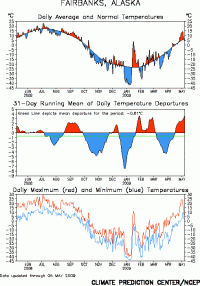
See larger image here.
Likewise Anchorage, which has averaged 0.98C below normal for the last year.
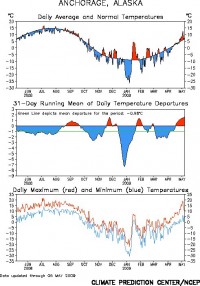
See larger image here.
Recall the Alaskan glaciers advanced for the first time in 250 years.
By Paul Chesser, Heartland Institute Correspondent
That would be Karl Bohnak, chief meteorologist at WLUC-TV on Michigan’s Upper Peninsula, who calls global warming alarmism his “pet peeve” and finally got so fed up with it that he wrote to his congressman, Democrat Rep. Bart Stupak. He shared his letter in a blog post on his station’s Web site:
For years as a broadcast meteorologist, I kept silent about the issue of “global warming.” Declaring skepticism labeled you (and still does) as an anti-environmentalist. After former VP Gore’s movie hit the big screen, I could remain silent no more. “An Inconvenient Truth” was filled with so many gross distortions and outright scientific misrepresentations; I felt it was my obligation to speak out.
CO2 is not a pollutant and it’s not a problem. The problem is rent-seeking corporations looking to cash in on cap and trade and low-output, high-cost alternative energy. As your Michigan House colleague Congressman Dingell says “cap and trade is a tax, and it’s a great big one.” This is not the time to raise energy prices, which is what this bill will surely do. I believe the majority of your constituents will suffer adversely if this legislation is passed.
After receiving Stupak’s standard constituent letter, Bohnak responded with some data that clarified some of the congressman’s misconceptions. Then Bohnak addresses readers of his blog, and specifically takes aim at his own industry - the media:
Note Congressman Stupak’s response on the issue of higher energy costs. He states that he wants to make sure “unreasonable costs” are not passed on to consumers. I ask, “What are unreasonable costs?” I do not want to pay ANY higher costs (reasonable or unreasonable) for a problem that just isn’t there.
I ask you to look at the data. Don’t fall for the line that “An overwhelming majority of scientists agree that carbon dioxide and other greenhouse gases are causing this unusual warming of our planet.” Majority rule is not how science is conducted. If one wants to play that game, there’s a growing segment of scientists that have declared themselves “global warming skeptics.” Get as much information as you can, but you will NOT get it from the mainstream media (MSM). The MSM is in the business of whipping up fear (look at the recent swine flu story). Stories that the world is heading toward a precipice are right up its alley. Also, there is at least one corporate media owner (My note, not Bohnak’s: this is General Electric, owner of NBC) that has a high stake in seeing this bill passed.
A subtly brave statement by Bohnak, considering his station/s network affiliation. Good for him. See Paul’s post here.
By Ben Dowell, The UK Guardian
Newsnight is facing a 15% budget cut and two BBC environment and science reporters will also lose their jobs as part of BBC News’s latest round of job losses. BBC News insiders are said to be “horrified” by the proposals, which were put to the Newsnight and science and environment teams along with the rest of the division’s staff earlier this week.
Newsnight is expected to make a 15% budget reduction as part of the cuts. The BBC2 programme’s culture correspondents, Madeleine Holt and Steve Smith, will become general reporters. One general reporter will then be lost from the programme’s pool of around seven in total. The two science and environment jobs will disappear as part of a plan to cut 88.5 posts from BBC News by next April as part of the corporation’s five-year saving plan announced in 2007 aiming to save 155m punds.
BBC News’s team of science and environment correspondents includes Roger Harrabin, David Shukman, Christine McGourty, Pallab Ghosh, Sarah Mukherjee and Jeremy Cooke, all of whom report for various news programmes across BBC TV and radio services.
“The science and environment beat is a massive growth area and the reporting team are pre-eminent so many there are puzzled to say the very least about it,” said a BBC source. “It needs expertise for these stories, a lot of preparation needs to be put in, and to lose two reporters in one go is madness.” Te source also pointed at the “huge irony” of the decision given the “importance the organisation places on climate change as part of the news agenda”. Read story here.


